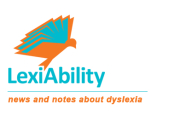According to the National Institutes of Health and replicated longitudinal studies, dyslexia affects 20 percent of the population. Remediation using an Orton-Gillingham-based program can improve reading and writing skills caused by dyslexia.The findings, published in the journal Neuron, provide important insights into the cause of this common reading disorder and address a long-standing debate about the role of visual symptoms observed in developmental dyslexia.
The study finds that individuals with dyslexia often exhibit subtle weaknesses in processing visual stimuli. Scientists have speculated whether these deficits represent the primary cause of dyslexia, with visual dysfunction directly impacting the ability to learn to read. The current study demonstrates that they do not.
 “Our results do not discount the presence of this specific type of visual deficit,” says senior author Guinevere Eden, PhD, director for the Center for the Study of Learning at Georgetown University Medical Center (GUMC) and past-president of the International Dyslexia Association. “In fact our results confirm that differences do exist in the visual system of children with dyslexia, but these differences are the end-product of less reading, when compared with typical readers, and are not the cause of their struggles with reading.”
“Our results do not discount the presence of this specific type of visual deficit,” says senior author Guinevere Eden, PhD, director for the Center for the Study of Learning at Georgetown University Medical Center (GUMC) and past-president of the International Dyslexia Association. “In fact our results confirm that differences do exist in the visual system of children with dyslexia, but these differences are the end-product of less reading, when compared with typical readers, and are not the cause of their struggles with reading.”
 “Early identification and treatment of dyslexia should not revolve around these deficits in visual processing,” says Olumide Olulade, PhD, the study’s lead author and post-doctoral fellow at GUMC. “While our study showed that there is a strong correlation between people’s reading ability and brain activity in the visual system, it does not mean that training the visual system will result in better reading. We think it is the other way around.”
“Early identification and treatment of dyslexia should not revolve around these deficits in visual processing,” says Olumide Olulade, PhD, the study’s lead author and post-doctoral fellow at GUMC. “While our study showed that there is a strong correlation between people’s reading ability and brain activity in the visual system, it does not mean that training the visual system will result in better reading. We think it is the other way around.”
To read the full article about this study, please visit medicalnewstoday.
(Image credit: Ken Wilcox/Flickr)






Connect with LexiAbility
RSS
Facebook
Twitter